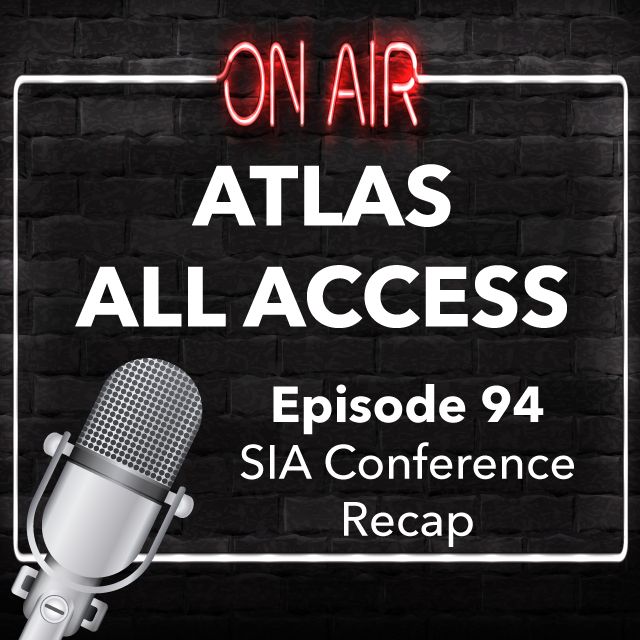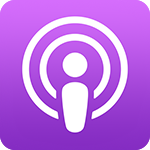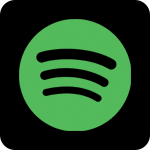
Atlas hits the SIA Healthcare Conference - What Happened? - Atlas All Access 94
11-15-2019
The SIA Healthcare Summit brought in industry experts from all over. Hear how Atlas interacted, learn about the panels we spoke on, and what the future holds for the healthcare staffing industry.
If you are a travel nurse, a travel healthcare pro, a recruiter, or even in the industry, this is one you'll want to check out.
This week, Atlas VP Rich Smith chats with our VP of Recruitment Kurt Chase -- find out what these two industry pros took away from this year's SIA conference, and what it means for Atlas.
From the Podcast: "Fast forward to two years. We're at SIA. There was more conversation and collaboration between the companies that I have ever heard in my life." - Kurt Chase
"I was surprised to see the level of participation, the level of people reaching out. That collaboration was happening at a very high level all the time." - Rich Smith "Even though I believe people are now sharing more information and ideas, I still believe we are the pioneers." - Kurt
"Here's what's special. What's special is the people that are behind the scenes doing it. That's what's special." -Rich
"How? And the easy answer there, is it's the same answer to the 'secret sauce' question. You care. You just care. You can't automate the human touch. And the more you try to automate, the further you're going to get from that. And it will slow down your growth. it will slow down your business. It will hurt you in the end." -Rich
Rich Smith: On this episode, we talk all about the SIA Healthcare Staffing Conference. What we took away from it and all the information that they had to share we'll share with you guys right now. Atlas All Access starts now.
Rich Smith: Kurt Chase. Welcome back to the studio.
Kurt Chase: What up? What up?
Rich Smith: So this was your first, and this wasn't my first SIA Conference. Staffing Industry Analysts for those that maybe don't know, right? I mean big group kind of gives a bunch of information to the staffing community, not just healthcare but staffing in general. So this was your first experience at SIA. Talk about going into it. Like what did you expect? Like what were your preconceived notions about all of this?
Kurt Chase: Yeah, it was my first time at SIA, although I have met probably a lot of the participants throughout the year. I think my expectations weren't any different than any other conference really, to be honest with you. I knew that there were going to be a ton of companies there, some jockeying for position, some willing to collaborate on information and ideas and yet some unwilling to be as open. So, again, it wasn't my first time going to a conference, but I knew this was going to be a big conference.
Rich Smith: And that's kind of my takeaway too. So this was, I've been to SIA conferences before, but this is my first healthcare only conference. And that was kind of my same takeaway is we were going to see a lot of companies that we know, maybe a lot of new ones that we don't know, but one of the things I thought in my head was like, "Okay, if you're relevant in the industry, if you're a company and you're relevant in the industry, then you attend this." Because there was so much good information. How you maybe interact with other companies or what panels you attend or whatever is completely up to you, completely up to that company. But just being there, attending it and then understanding exactly what's happening in the industry and their kind of forecasts for all of us is vital, is vitally important.
Kurt Chase: Absolutely. And I knew SIA is ... they provide just statistics and trends and ideas of being a better company and the way that you should go as far as the process and things that you should look out for as far as pitfalls. So in that sense, I was very much anticipating the opportunity to go and listen to maybe and/or learn something that I didn't know.
Rich Smith: What did you then get outside of your preconceived notions going into it, then when we actually got there and maybe after we've attended all these different things and maybe on our flight back, what did you reflect on? What did you get most from the conference?
Kurt Chase: I believe it had nothing to do with the information that was disseminated. I'm going to take us back a little bit. We had made, I'm talking about Atlas, had made a conscious effort to share information to, if you will, improve the industry overall by influencing who we could in order to do this the right way. Fast forward to two years, we at SIA. There was more conversation and collaboration between the companies that I've ever seen in my life. And that I think was the most resounding thing that I took away from it. That what it seemed like we were a pioneer with the idea of started to resonate through some of these other companies and they were more than willing to share some of the secrets and the processes that they have in place to be successful.
Rich Smith: I think you're ... and you're 100% right on. And I anticipated seeing this anyway just from kind of how the past two-ish, two, three-ish years have gone for us here at Atlas in general. What I was surprised to see was the level of participation. The level of people reaching out. And it wasn't only us, because we would make a conscious effort to introduce ourselves to whoever that would be. They would come to us or we see them going to somebody else or that type of thing. Where that collaboration was happening at a very high level all the time. And I think that kind of leads me into my next question is you saw it in the panels. So in the different panels themselves, they have motivational speakers and you know, whatever.
Rich Smith: Which were great. The two guys they had speaking, one was strictly a marketing guy, the other was a Navy SEAL, was on SEAL Team One, which he was fantastic. He was unbelievable to watch. But outside of that, they had panels of us, just owners of companies, VPs of companies talking openly about trends in the industry or anything like ownership and that type of thing. So out of watching this, and let's take Steve's panel for example. So Steve was on a panel with MedPro, Medix, and there was one other company, I can't, no, I think it was just those two, right? It was us, MedPro and Medix.
Kurt Chase: Yes.
Rich Smith: And then there was the moderator and the guy that wrote the book.
Kurt Chase: Correct. Correct.
Rich Smith: So out of that panel with Steve, what was your biggest takeaway from that?
Kurt Chase: Steve played to everything I know Steve to be. And that's being transparent, right? Talking to a couple of people after that. After that breakout session. They loved the fact that he was genuine or came across as genuine, which we know him to be.
Rich Smith: That's just who he is.
Kurt Chase: That he was willing to share down to the nth degree, even to the fact that he can't tie his shoes and he gained too much weight.
Rich Smith: Because he's gained too much weight. Right, exactly.
Kurt Chase: That's a whole different situation.
Rich Smith: Yes.
Kurt Chase: But they really love the transparency and his willingness to share everything. Even though I believe people are now sharing more information than ideas, I still believe we are the pioneers and because Steve is who he is, that's what stood out to me, because it was on another level in which he was sharing his information.
Rich Smith: My takeaway from his panel was there couldn't be two more different ways to run a company, but then between us and MedPro, and both equally successful. I believe MedPro is larger than us. Right? I mean they've been around a little bit longer than us too. But two drastically different ways to run a company, both very, very successful and both very appreciative of the other understanding that even though I might believe, and Steve might believe and you and everyone else here that our way is the best way. They believe their way is the best way. And they live it every single day. And to see the passion that she had talking about her company and then the passion that Steve had talking about Atlas, where it was this crazy dichotomy of two different companies that I didn't expect to see, but that's what we got out of it.
Kurt Chase: You're absolutely right. Again, what we do, how we do it here is absolutely different. I mean, you used the example of MedPro, but you could say that about a lot of different companies in that sense, but I think that's the difference going back to the sharing of the ideas. We're tolerant of each other now opposed to trying to just absolutely destroy the next company or that company because they do it a different way. So it was just good to see. It was good to see.
Rich Smith: So my panel turned into a more of a branding discussion and I don't know if that, I think the questions kind of led itself that way. So it was myself, Kathy Kohnke, she's been in the industry for 35 years, Like she was at All About Staffing. So anybody that knows All About Staffing knows that they became Parallon and then was there even, was there something before Parallon before it was All About Staffing Parallon HealthTrust. I don't know if there was a name in between. Anyway.
Kurt Chase: I can't remember.
Rich Smith: She was there all the way back into those days. And then Meg from Stability Healthcare out of Los Angeles.
Kurt Chase: Los Angeles.
Rich Smith: Great. She was dynamic. And we've connected on LinkedIn now, just a fantastic resource for a very different company than us too. And then the co-founder of Trusted was on with us as well. So, I think my biggest takeaway from being on stage there was, again, way different kinds of ways to run a company, but branding and in the end will set you apart.
Rich Smith: And I think that's what I took out of it as we all kind of worked through. Kathy was very open about talking about, you know, they do strike work where she's at Fastaff now and that's like, that's her thing and it's, they need 6,000 nurses in California for a strike or whatever. She talked to about one in Michigan where they called up and they needed 800 and then at 800 turned into 1600 and she had to tell him "No, because I don't have 1600 Michigan licensed nurses." Like vastly different, but at the same time still very successful.
Kurt Chase: Well, as a consumer in the room of the information that was being shared, I focused on you, me, you representing me up there on the stage. So I kind of focused on you, your message compared to everybody else's message. So admittedly, I was more focused on you than anybody else. But what I heard was, and I'm going to toot your horn here for a little bit, so don't get stupid later on.
Rich Smith: Oh, I will, I definitely will. Make sure all these cameras are recording.
Kurt Chase: Ah, shut those off. But it was clear that you were light years ahead of these other places and people, that you were ahead of your time, if you will, with what you started here with the branding and the experience that, I don't know if they could digest actually what you were saying to the level in which you're doing what you're doing. Like when you mentioned, yeah, we have a green room and just ... they were like, "What?" Like I'm in the audience and I hear, "What? What are you saying?" They had no idea. So I remember when this all kicked off, I were like, "What are you talking about, Rich? Do we need all that?" But-
Rich Smith: Here at Atlas like two and a half years ago.
Kurt Chase: Two and a half years to three years ago.
Rich Smith: Right.
Kurt Chase: But us doing the work, the hard work, the people out here doing the hard work, you've got a vehicle to let everybody else see what we're doing. And that's just as important. If you were producing water over here and nobody knows about it, I mean, how important is it? You know? I got to give you credit that you had the foresight to understand, well, what we were doing here is special and you wanted that to get out to the masses. And I don't believe at that point in time that they knew, like I said, to what degree that we are involved and committed to this thing.
Rich Smith: And I think this was a conversation that Steve and I had ahead of time, maybe on the way there was how much do you share? How much do I share about, not that they can't see all of this, right? I mean, they see it every day anyway if they're watching. One of the questions I had, one of the first questions that the panel had was from a competitor, a larger competitor saying, "I like your stuff. I like watching your stuff or whatever." They could 100% do the exact same thing that we're doing that that green wall right there costs like, what's a gallon of paint costs, right? That's just a green gallon of paint. There's nothing special about it. And then you understand how, now here's what's special, what's special is the people that are behind the scenes doing it. That's what special.
Rich Smith: You can't just hire any two guys or it came up in a different meeting like I think I'm hiring a marketing company to handle some of this for me and in my head I'm thinking, "Do that." Because those people don't care.
Kurt Chase: Don't care at all.
Rich Smith: They have no idea who you are. Do it, please. But at the same time, then you want to raise your hand and say, "You might want to think about that. You may want to think about not doing that because they don't know who you are. And you're going to get generic videos with free music and the picture of the sunset that everybody uses."
Kurt Chase: You're absolutely right. So you have to get people that's vested in the same ideas which you are. I think what a lot of people don't get is the level of commitment that you had in the first day. You know what I mean? "I want to do this. This is what I'm doing. I'm owning it. Let's go." You know? So it's that commitment. We've seen other people try it.
Rich Smith: Oh, sure.
Kurt Chase: But they don't understand the commitment and the consistency that you put into this thing.
Rich Smith: Right, no.
Kurt Chase: You know. So we are where we are today because you laid the groundwork two and a half years ago. People are just seeing it now. So that's what I, conceptually I don't think most of the people in that audience got what you were actually saying.
Rich Smith: Gotcha. Quite honestly from a competition standpoint, because we are still all competitors. I'm totally fine with that.
Kurt Chase: Me too.
Rich Smith: I'm absolutely fine with that. I can help all, you know. That's fine. It's goodwill and stuff, but I'm okay with that.
Kurt Chase: Me too.
Rich Smith: All right, so one takeaway. Last question. One takeaway from the conference. One thing that you remember that sticks in your head. I'll go first because this is near and dear to me. I talk about it every single day here at Atlas. The recruiter is not going away. There is no way that this industry moves forward and it was even echoed in other panels later on that there's no way the industry moves forward without the recruiter, without the recruiter on the phone, texting, emailing, talking, whatever. That person is not going away. Now, their job description may change, their hours may change, but the tried and true recruiter model, the one-on-one recruiter and traveler model is here to stay. It's not going anywhere and that was loud and clear through the whole thing for me.
Kurt Chase: Sure. That would be number one for me as well. You know, what I do here, and you know I have been a recruiter for X amount of years and when the other style, if you will, form of doing business came about, you know me, I was like, "They can't last." So you know, I echo those same sentiments. But if I have to pick something else that is, that I took away from it, is our position in the industry has changed not just from our standpoint, and this is totally coming from me and I could be totally wrong, but we used to be in that position where we were always seeking people and trying to get the connection and get that next deal, if you will, to help our company.
Kurt Chase: We had so many people, so many more people seeking us out and trying to get our information and trying to figure out what the secret sauce is that I don't get out as much as some other people in the office, but getting out this time and having the concentration of companies and people in one place, that totally was a turnaround from us being the hunter, so to speak, to being hunted.
Rich Smith: Exactly.
Kurt Chase: So, that was of the things that, again, you know, that was self-satisfaction, personal satisfaction, that we have come a long way in a short time to kind of elevate our position within the industry.
Rich Smith: True. True. Well, and I shared that with at least one other company, which will remain nameless, because they're larger and they seem to have their feet under them or whatever. And they certainly have their feet under them. But their question is how? And I think the easy answer there, it's the same answer to the secret sauce business. Right?. [inaudible 00:18:28] should care. You just care. You can't automate the human touch. And the more you try to automate, the further you're going to get from that. And that, it will slow down your growth. It will slow down your business, it will hurt you in the end. So, I think that was-
Kurt Chase: Totally, totally agree.
Rich Smith: Yeah, absolutely. Well, Kurt, it was fun. I want to go next year, I guess next year it's in Houston I think. There was a, I think, I'm not sure.
Kurt Chase: I'm not sure either, but.
Rich Smith: Yeah. So next year it's in Houston. I'm sure we'll attend again.
Kurt Chase: Let's do it.
Rich Smith: Yeah. All right.
Kurt Chase: Let's do it. Thank you so much.
Rich Smith: Thank you.
Kurt Chase: We'll see next week.



